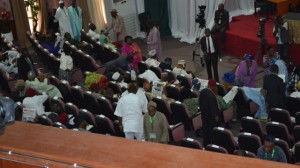
Resolution of two critical issues that have caused a deep divide at the National Conference formed a part of the plenary session of the Conference on Wednesday, a day partially devoted to debate on the modalities for the implementation of the Conference report.
One of the issues which were handled by a special committee comprising leaders of geo-political zones and other selected delegates was the Land Use Act and the contentious argument as to whether or not it should be removed from the constitution. The other critical issue which had split the Conference into two regional blocs was the Derivation Principle. It bordered on whether the existing 13% allowed by the Constitution should be retained, reduced or increased.
On the Land Use Act, the argument for its retention in the 1999 Constitution was based on the belief that allowing the Act to go would give chance for oligarchs to take over lands which the Land Use Act has democratised with the government as the intervening body.
Supporters of this school of thought also said that since land is not a renewable commodity, it must not be left at the mercy of land speculators; and that removing it from the constitution would be discriminatory and unjust to the poor. It was their position that removing the Act from the constitution would create dichotomy; describing the suggestion as a grand design for the rich to buy land at cheap prices, a situation they said would lead to crisis that cannot be managed.
On the other side, the argument was that the Land Use Act should remain a law but must be removed from the constitution to make it easy for amendment. They argued that, at present, amending the Act through the constitution has become too cumbersome and that, in other countries, land tenure is universal while governments nearest to the communities serve land tenure better. They complained that governments have taken peoples land and have refused to pay compensation; and that since the promulgation of the Act, access to land has remained a major problem, thus hindering economic development.
It was also stated that the power of compulsory acquisition vested on state governors has been, in most cases, used arbitrarily without the payment of adequate compensation to land owners. The committee noted that both sides of the argument were convincing; unfortunately none of them agreed with the other and no side agreed to back down.
Thus, in its decision which was accepted by the Conference, it was stated that the Act would be retained in the constitution while certain amendments would be carried out in certain sections of the Act. For instance, one of such amendment would enable land owners to determine the price and value of their land. It allows government to negotiate with land owners and not compensate them.
It was also resolved that the customary right of occupancy in Section 21 of the Act be amended to read “Customary Right of Occupancy should have the same status as statutory Right of Occupancy, and should also be extended to urban land”. It was also agreed that Section 7 of the Act which deals with the restriction on rights of persons under the age of 21 to be granted statutory right of occupancy should be amended to read “restriction of persons under the age of 18”. This, it was argued, is because the Child Rights Act stipulates that a person attains adulthood at the age of 18. With the decision on the issue of the Land Use Act, the report of the Committee on Land Tenure Matters and National Boundary was formally adopted, as amended.
